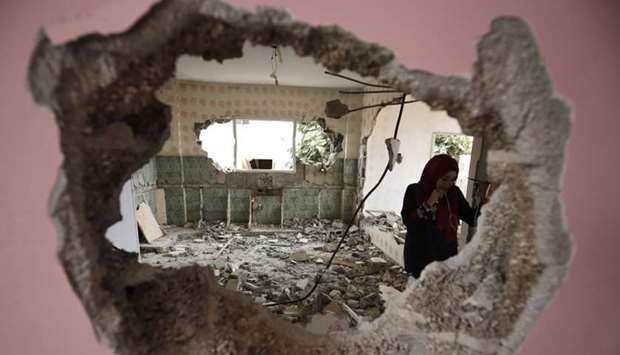Israeli forces on Wednesday demolished the home of a Palestinian who fatally stabbed three Israelis in a nearby Jewish settlement last month at a time when tensions soared over Jerusalem's Al-Aqsa mosque compound.
The military confirmed the demolition in the village of Kobar in the occupied West Bank.
Residents said that army vehicles and bulldozers entered the area north of Ramallah at around 3:00 am (0000 GMT) and surrounded the two-storey house, one floor of which was still under construction.
Clashes broke out in the area between stone-throwing Palestinians and Israeli soldiers. According to the Palestinian Red Crescent, 12 people were wounded by rubber bullets.
Video appeared to show a Palestinian news cameraman, Mohammed Radi, being hit in the nose with a rubber bullet. It seemed from the video that clashes were not taking place at that time and location.
Radi was later treated at a hospital in Ramallah, while Israel's army said it was looking into the report.
"During overnight activity in the village of Kobar, a riot of about 100 Palestinians erupted," an army spokeswoman said.
"The protesters ignited tyres and hurled rocks toward (Israeli) soldiers. The forces used crowd control measures to disperse the riot."
Israel regularly demolishes the homes of Palestinian attackers, calling it a deterrent against future violence. However, human rights groups say it amounts to collective punishment.
In recent weeks, Israeli authorities also arrested the father, mother and three brothers of 19-year-old Omar al-Abed who attacked the settlement, according to fellow villagers.
The family members are suspected of having known of Abed's plans to carry out the attack in nearby Neve Tsuf, also known as Halamish, and of failing to prevent it, Israeli media reported.
The army said the assailant, who was shot while carrying out the attack and later arrested, had spoken of Al-Aqsa and of dying as a martyr in a Facebook post.
The July 21 attack came with tensions high over the highly sensitive mosque compound in Israeli-annexed east Jerusalem, known to Jews as the Temple Mount.
Violence erupted in and around the compound last month after three Arab Israelis shot dead two policemen on July 14 before being killed by security forces.
Israel responded to that attack by installing metal detectors at the entrance to the holy site, used as a staging point for the attack.
For nearly two weeks, worshippers refused to submit to the checks and held mass prayers in surrounding streets.
Ensuing protests and clashes left seven Palestinians dead, and the stabbings of the Israelis at the settlement was carried out at the height of the tensions.
The crisis abated when Israel removed the detectors, but Israeli police have been carrying out arrests linked to the unrest.
Seventy-two Palestinians have been arrested in the past week, including 43 charged and still in custody over the troubles in July, police said in a statement.

A woman checks the remains of the house of a Palestinian man, who killed three Jewish residents of a nearby Israeli settlement, after it was demolished by Israeli authorities in the West Bank village of Kobar, near Ramallah
